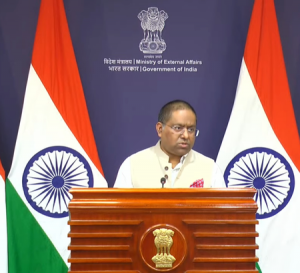The BJP-led NDA is likely to win majority, while the opposition INDIA bloc has made significant progress.
BJP faced surprising defeats in three Hindi states and must form government with allies after a divisive election seen as a test of Modi's popularity.

New Delhi: The BJP faced a major blow as they suffered significant losses in three key states in the Hindi heartland, according to early poll results released on Tuesday. This outcome has caused the party to rely on its allies in order to form a government, after a contentious and divisive election that was seen as a referendum on the popularity of Prime Minister Narendra Modi. After 12 hours of vote counting, which began at 8am, the Bharatiya Janata Party (BJP) emerged as the single largest party with a lead or victory in 240 seats.
However, this is a major decrease from the 303 seats they won in the previous election, which marked the end of coalition politics in the country. The BJP's key allies, N Chandrababu Naidu's TDP and Nitish Kumar's JD, were also leading or winning in 16 and 12 seats in Andhra Pradesh and Bihar respectively. Together with other allies, the BJP-led National Democratic Alliance is expected to reach the majority mark of 272 seats.
In Andhra Pradesh, the TDP also had a strong showing in the assembly elections, dethroning YS Jagan Mohan Reddy's YSRCP. Congress president Mallikarjun Kharge hailed the poll outcome as a victory for the people and for democracy. "We have always said that this battle is between the public and Modi...
This mandate is against Modi. It is a major defeat for a leader who campaigned on his own name. He has suffered a moral defeat," Kharge told reporters at the AICC headquarters, joined by Congress leaders Rahul Gandhi and Sonia Gandhi after the good performance by the Congress party.
This is the first time in his political career that 73-year-old Modi, who was on track to equal Jawaharlal Nehru's record as prime minister for a third consecutive term, will have to rely on allies to form a government. In response to the results, Prime Minister Modi expressed his gratitude to the people for their trust in the NDA and described the expected majority as a historic feat in India's history. He promised to continue the good work done in the last decade to fulfill the aspirations of the people.
The election also highlighted the revival of the main opposition Congress party under Rahul Gandhi, and the surprising role of the Samajwadi Party (SP) in Uttar Pradesh, led by Akhilesh Yadav, as a giant slayer. The trends and results did not match the landslide victory that the BJP-led NDA had hoped for, as projected by the exit polls. More than 640 million votes were counted in the world's largest democratic exercise.
The Congress, which is part of the opposition INDIA alliance, won or was leading in 99 seats, a significant increase from the 52 seats they won in 2019, eating into the BJP's share in Rajasthan and Haryana. The INDIA bloc won or was leading in over 200 seats. In Uttar Pradesh, the BJP won or was leading in 33 seats, a decrease from the 62 seats they won in 2019.
The SP, on the other hand, was winning or leading in 37 of the 80 seats at stake. This can be attributed to three factors - the consolidation of Muslim votes in favor of the SP, smart seat-sharing agreements with Congress to avoid splitting non-BJP votes, and widespread dissatisfaction with the BJP government over issues such as unemployment and rising prices. Modi managed to retain his seat in Varanasi, but with a reduced victory margin of nearly 1.53 lakh votes.
In 2019, his margin was 4,79,505. Meanwhile, Rahul Gandhi, often ridiculed by the BJP as 'Shehzada', won the Wayanad and Rae Bareli seats with a significant margin of 3,64,422 and 3,90,030 votes respectively. The campaigning for the elections, which took place from April 19 to June 1 in seven phases, was marked by divisive communal issues and heavy reliance on Modi to secure votes.
The prime minister held over 300 rallies, tirelessly traveling to multiple locations almost every day. The results also shattered the BJP's narrative that they would make significant gains in the southern states this time. In fact, they failed to win any seats in Tamil Nadu and also lost seats in Karnataka.
However, the BJP did make significant progress in Kerala, winning a seat for the first time in a state where the Congress and the Left are the major political forces. They also performed well in Telangana, where they won or were leading in 8 seats. Popular Malayalam actor Suresh Gopi also helped the lotus bloom by winning the Thrissur seat in Kerala.
In Andhra Pradesh, BJP ally Telugu Desam Party won or was leading in 16 seats, while the BJP was ahead or winning in three. Meanwhile, in West Bengal, another key ally of the opposition alliance, Trinamool Congress, was leading or winning in 29 seats, more than their 22 seats in 2019. The BJP, who won 18 seats in the last Lok Sabha election, was ahead in 12 seats.
The biggest setback for the BJP, who faced a stronger challenge from the opposition, was in the northern states, where they suffered losses in Uttar Pradesh, Rajasthan, and Haryana. The results also marked a return to regular politics, with voters showing more concern about bread and butter issues, especially in some Hindi heartland states where the opposition INDIA alliance managed to rally supporters around issues of unemployment and rising prices. In Maharashtra, with 48 Lok Sabha seats, the Shiv Sena was divided since the last election.
The BJP, who won 23 seats five years ago, was now leading in 11 seats, while their ally Shiv Sena had a lead in seven. On the other hand, the Congress was leading in 12 seats, up from one, and the Shiv Sena in 19. The NCP Sharad Pawar faction was leading in seven seats, giving the INDIA alliance, formed on the basis of a shared dislike for the BJP, a possible 38 seats.
However, Union ministers Nitin Gadkari and Piyush Goyal provided a silver lining as they appeared to be on track for easy victories in Nagpur and Mumbai North respectively. In Odisha, the BJP performed exceptionally well, with leads in 19 out of 21 seats, while the ruling Biju Janata Dal was reduced to just one. The BJP was also ahead in the Odisha assembly elections, leading in 76 out of 146 seats, a major victory in a state they had never been able to capture.
In Andhra Pradesh, the TDP led by Chandrababu Naidu was ahead in 16 out of 25 seats, while the BJP was leading in three and the YSRCP in four. In Karnataka, the Congress seemed to be making gains, with leads in nine seats, up from one last time. The BJP, who won 25 seats in 2019, was leading in 17.
Tamil Nadu told a different story, with the ruling DMK leading in 22 seats and their ally Congress in nine, one more than their 2019 positions. Overall, these results signaled a return to regular politics, with voters focusing on issues that directly affected their lives, rather than divisive rhetoric or hyper-personalized campaigns.










